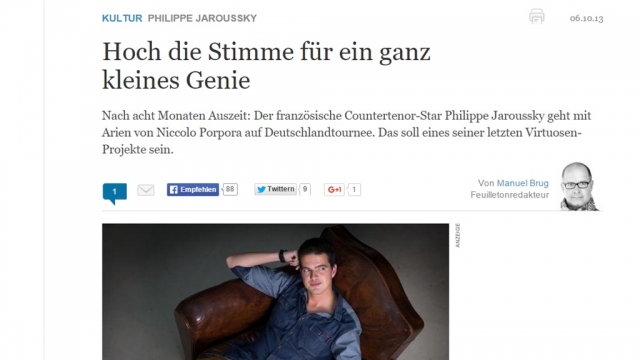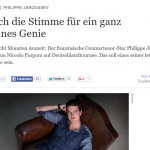2013-10-06, Die Zeit, by Manuel Brug
Die Welt: Und sind Sie als neuer Mensch zurückgekommen?
Jaroussky: Wie man so schön sagt, ich habe schon ein wenig als Sänger auf meine innere Stimme gehört. Habe ein bisschen Bilanz gezogen. Und ich weiß jetzt sicher, dass die aktuelle Porpora-CD eines meiner letzten wirklichen Virtuoso-Projekte ist. Ich habe in den vergangenen Jahren so viele verzierte Arien gesungen, ich habe fast schon ein wenig genug von all dem Vokalfeuerwerk. Obwohl es Spaß macht.
Source/Read more: [x] Disclaimer: The following is not a professional translation; no profit is being made, no infringement of copyright is intended.
Raising the voice for a tiny genius
Right now, Philippe Jaroussky is the world’s most famous counter-tenor. But the 35 year old Frenchman who had his great breakthrough in 1999, after just three years of singing education, already thinks one step ahead. With his enormous heights he already had his great share in the renaissance of Vivaldi’s operas, and now he goes on to use his popularity to try and call our attention to unknown aspects of the former castrato cult as well – for instance regarding the composer Nicola Antonio Propora. We had the chance to speak with him right before the start of his tour through Germany.
Die Welt: You took an eight months sabbatical. What does a counter-tenor do during this time?
Philippe Jaroussky: The same as anybody else – nearly. I traveled for four months, I went to South America, Australia – where I gave a few concert after all, because I won’t be able to return there until 2017 –, and then to New Zealand and Thailand.
Die Welt: And did you return as “a new man”?
Jaroussky: As the saying goes, as a singer I really listened to my inner voice a bit. Struck a balance in a way. And now I know for sure that my new Porpora CD is one of my last real virtuoso projects. In the last years I sang so many embellished arias that I have nearly grown a little tired of all the vocal fireworks. Although it’s a fun thing to do.
Die Welt: What’s the alternative?
Jaroussky: Bach, Handel’s oratories, sacred music. I think that now I have the maturity and the experience that are needed for the Simple, and I want to put my mark on it. Which won’t necessarily be easy. As to Handel’s oratory “Theodora”, David Daniels still echoes in my ear, who did a fucking good job as Didimus under the baton of William Christie in Glyndebourne, and who really sang like an angel. That won’t be easy to reach. And there are Purcell and Dowland on my schedule too, and I also intend to browse the works of Scarlatti, Jommelli, Paisiello, Cimarosa, Graun and Telemann a little.
Die Welt: The Gluck year is ahead, now isn’t that a godsend for counter-tenors?
Jaroussky: Of course, but in this regard I don’t have so many irons in the fire. At some stage there will surely be the Orfeo again whom I sang already but who is a little too low for me, and who was written for an alto like Bejun Mehta. But there is also a higher version for a soprano castrato that was staged in Naples, moreover with a few external insertions that nicely speak of the practice of this era where the scores were not as “holy” (meaning fixed) as today. I think I will do that. The original version will be too strenuous for me today, as my voice has mightily bloomed in the heights during the last years. A strange phenomenon, which I also noticed in my younger colleague Franco Fagioli who for a long time also seldom used his upper registers.
Die Welt: …and who also sings a few Porpora arias on his solo album that’s dedicated to the castrato Caffarelli…
Jaroussky: Why not? I too have used the castrato Farinelli’s fame for my CD in order to promote this composer who was underrated for so long.
Die Welt: Was he really a genius?
Jaroussky: At least a little. An icon of transition to the gallant style and later on to Mozart, as was Johann Christian Bach. He was one of the best teachers for singing and composition of his time. That’s already not a little, is it? In his about ten operas for Farinelli he usually included five arias for him, and they are outstanding. So one already gets 50 from which I chose eleven. Because Porpora was already quite smart in terms of economics, those are usually the only good arias in these operas. He knew exactly that the audience only listens when the stars are singing. Why waste one’s talents then? Only in his “Polifemo” that premiered in 1735 in London, and that was intended to be a strong weapon against Handel’s crew, he is good throughout. But there he had four stars at his command. And therefore I would like to fuel the small Porpora boom a little by taking part in a stage production that will take place in September 2015 as part of the Musikfest Bremen and that will tour from there. So I won’t entirely abandon virtuosity. And to be totally honest: It’s easier for me to penetrate big halls with high notes as my voice just carries better this way.
Die Welt: Do counter-tenors have to think earlier about their future after their singing career (as other kinds of singers)?
Jaroussky: Our voices seldom last until the age of sixty, as experience shows. So one really needs to have a forward-looking strategy even when one’s vocal apparatus still works completely fine. Going forward, I will use my middle range to a greater degree. And for instance I still want to make a program with art songs (Kunstliedern) of the Romantic period. In terms of music there lies an entirely different world that really pushed me forward enormously.
Die Welt: Will counter-tenors be totally normal (natural) in 20 years’ time?
Jaroussky: Never. Of course when it comes to education we are a voice category like any other. The audience has got used to our sound. And now we also have many more brave boys (than before) who already start their career as sopranists, so that today I would really have to make an effort with my former technique. But the castrato repertory really is something unusual, and the audience will always feel something special when a man can sing so high. And one really has to acknowledge that.
Die Welt: How did you tempt Cecilia Bartoli to participate in your CD?
Jaroussky: We like each other a lot, and our voices go together well, but I am shy, and for a long time I didn’t dare to ask her. And then she said “Yes” on the spot! But of course, she had also asked me regarding her Steffani project. And please don’t pass it on: In order for us to realize this project so quickly, we sang for each other for free, renouncing any rights to it. Or else our record companies would still be negotiating, and we would have lost interest long ago.
Die Welt: What will come after Porpora?
Jaroussky: A crazy project with the queer (meaning a little weird) Christina Pluhar, and before that Pergolesi’s Stabat Mater with the extraordinary Julia Leshneva. That is totally pure, we really sound like two children in that.


